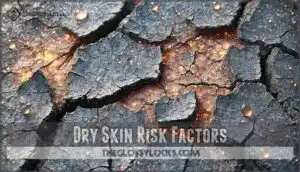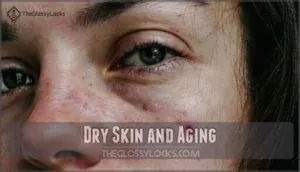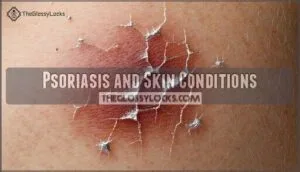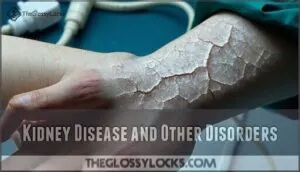This site is supported by our readers. We may earn a commission, at no cost to you, if you purchase through links.
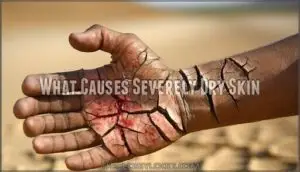
What causes severely dry skin often comes down to your environment stealing hydration—think winter air, scorching heat, or cranked-up heating systems.
You’re also sabotaging yourself with those steamy 20-minute showers and harsh soaps that strip away natural oils.
Age doesn’t help either, as your skin produces less oil over time, and medical conditions like eczema, diabetes, or thyroid issues can turn your skin into the Sahara Desert.
Even certain medications act like moisture vampires, and understanding these triggers is just the beginning of your skin rescue mission, which ultimately helps to address the root causes of severely dry skin.
Table Of Contents
- Key Takeaways
- Dry Skin Causes
- What Causes Severely Dry Skin
- Dry Skin Risk Factors
- Dry Skin and Aging
- Medical Conditions Linked
- Lifestyle Factors Contributing
- Genetic Predispositions
- Managing Dry Skin Triggers
- Frequently Asked Questions (FAQs)
- What causes excessively dry skin?
- What causes dry skin in older adults?
- What does dry skin mean?
- Why is my skin drier over time?
- How does dry skin affect people?
- Why does dry skin feel painful?
- Why is my skin suddenly extremely dry?
- Can dry skin be a symptom of something serious?
- Can stress worsen dry skin symptoms?
- Does air conditioning contribute to skin dryness?
- Conclusion
Key Takeaways
- Your daily habits are sabotaging your skin – Those long, hot showers, harsh soaps, and cranked-up heating systems strip away your skin’s protective oils faster than you can replace them, turning your once-smooth skin into a flaky, uncomfortable mess.
- Age works against your moisture barrier – After 40, your skin produces significantly less natural oil and becomes thinner, making it harder to lock in moisture like it did in your twenties, especially when combined with medications that act like moisture vampires.
- Medical conditions create internal moisture chaos – Diabetes, thyroid disease, eczema, and kidney problems disrupt your body’s natural hydration balance from the inside out, making even the best moisturizers feel like they’re fighting an uphill battle.
- Environmental factors steal hydration relentlessly – Cold weather, low humidity, sun exposure, and harsh winds create desert-like conditions that strip moisture from your skin’s surface faster than you’d expect, leaving you with persistent dryness that demands immediate attention.
Dry Skin Causes
Your skin becomes severely dry when it can’t hold onto moisture properly, and you might be surprised by how many everyday habits make this worse.
Your daily routine might be secretly stealing moisture from your skin faster than you can replace it.
From your morning shower routine to the heating system in your home, several hidden triggers work against your skin’s natural ability to stay hydrated and healthy.
Environmental Factors
Your skin’s worst enemy? Mother Nature herself.
Cold weather strips away moisture faster than you can say "winter blues," while low humidity creates a desert-like environment that leaves your skin parched.
Winter weather turns your skin into a moisture-starved desert faster than you’d imagine.
Sun exposure damages your protective barrier, and harsh winds accelerate dehydration.
These seasonal changes turn your once-smooth skin into a flaky, uncomfortable mess that demands immediate attention.
Using a quality winter cream product can help combat these harsh effects and provide a solution to the winter blues.
Harsh Soaps and Cleansers
That squeaky-clean feeling after washing? It’s actually your skin barrier crying for help.
Harsh soaps strip away protective oils faster than you’d peel off a bandage. Soap ingredients with high product pH levels damage your skin’s natural defenses.
You can find a suitable product here. Switch to gentle soap or nonfoaming skin cleanser alternatives for effective skin cleansing without the irritation that traditional skin detergents cause, and enjoy a squeaky-clean feeling.
Aging and Skin
Time becomes your skin’s biggest challenge as cellular turnover slows and collagen reduction accelerates after age 40.
Your body produces less sebum, weakening your skin moisture barrier and dropping hydration levels substantially. This natural aging process compromises barrier function, making you more susceptible to dryness.
Many people also use specialized skin creams to combat these effects.
Skin aging fundamentally transforms your protective shield into a leaky umbrella, which is a result of the natural aging process and can lead to a significant loss of skin moisture.
Underlying Medical Conditions
Beyond age-related changes, various health conditions can wreak havoc on your skin’s moisture levels.
Diabetes and thyroid disease disrupt your body’s natural hydration balance, while HIV status affects skin barrier function.
Chronic conditions like kidney disease cause systemic dehydration.
Nutrient deficiencies, metabolic disorders, and hormonal changes reduce collagen production, leaving your skin parched and vulnerable to systemic dehydration and affected by hormonal changes.
What Causes Severely Dry Skin
You’ve probably noticed that regular dry skin can sometimes turn into something much more uncomfortable and persistent.
When your skin becomes severely dry, it’s often because multiple factors are working together to strip away your skin’s natural protective barrier and moisture, leading to a condition that can be described as a breakdown of the skin’s natural protective barrier.
Impact Of Technology Advancements
Modern technology revolutionizes how you understand severely dry skin.
Digital diagnostics now pinpoint moisture deficiencies with precision, while telehealth impact connects you to specialists instantly.
App monitoring tracks your skin hydration patterns daily, and smart textiles adapt to environmental changes.
Personalized skincare algorithms analyze your unique needs, optimizing skin care routines.
EHR systems streamline patient management and improve treatment outcomes.
These advances transform skin health management completely, utilizing digital diagnostics to create a more efficient approach.
Challenges In Digital Transformation
Digital transformation challenges mirror severely dry skin causes in unexpected ways.
Legacy systems create barriers like dehydrated skin cells, while data silos fragment information flow.
The skills gap widens when organizations resist change, much like xerosis cutis develops from neglecting proper care.
Security risks emerge when protective barriers weaken, leading to skin dehydration and organizational vulnerability that requires immediate attention.
Many companies also struggle with talent and expertise gaps, hindering their progress due to legacy systems and security risks that can lead to digital transformation challenges.
Future Of Artificial Intelligence
Looking ahead, AI advancements won’t directly cause dry skin symptoms or xerosis cutis, but they’re revolutionizing how we approach skin dehydration.
Future applications in dermatology will predict itchy dry skin triggers before they strike.
While job displacement worries many, ethical implications around health data matter more, and the technological singularity might solve dry skin causes entirely through personalized treatment algorithms.
Dry Skin Risk Factors
You’re probably doing things every day that make your dry skin worse without even realizing it.
From cranking up the heat during winter to taking those long, steamy showers that feel so good, these everyday habits can turn your skin from smooth to sandpaper-rough faster than you’d think.
These habits can have a significant impact, making your skin go from smooth to rough in a short amount of time.
Cold Weather and Low Humidity
Cold weather acts like a moisture thief, stealing hydration from your skin’s surface.
When humidity drops below 30%, your skin can’t retain water effectively.
Indoor heating compounds this winter skin nightmare by creating desert-like conditions in your home.
Your skin literally shrinks and cracks as seasonal dryness takes hold, leaving you desperately seeking skin dryness relief through proper humidity management.
Frequent Bathing and Hot Water
Your daily bathing habits might be sabotaging your skin’s natural defenses.
Hot showers feel amazing, but they strip away protective oils faster than you’d expect.
Frequent bathing compounds this damage, leaving your skin barrier compromised.
A good way to help is using thermal spring water after showering.
Consider these bathing adjustments:
- Switch to lukewarm showers instead of scalding hot water
- Limit bathing duration to 5-10 minutes maximum
- Choose gentle, fragrance-free soap types
- Apply moisturizer immediately for proper post-bathing care
Certain Medications and Treatments
Prescription medications can secretly sabotage your skin’s moisture barrier.
Diuretics flush out more than excess water—they deplete your skin’s hydration. Retinoid dryness from acne medications strips natural oils, while chemotherapy effects damage skin cells. Even antacid effects alter your body’s mineral balance, affecting skin health.
| Medication Type | How It Causes Dryness |
|---|---|
| Diuretic Impact | Removes excess water and essential skin moisture |
| Acne Medications | Strips natural oils and thins protective barrier |
| Chemotherapy Effects | Damages healthy skin cells during treatment |
| Antacid Effects | Disrupts mineral absorption needed for hydration |
Nutrient Deficiencies and Poor Diet
When your plate lacks essential nutrients, your skin pays the price through increased dryness and irritation.
Vitamin deficiencies in vitamin D, vitamin A, niacin, and zinc directly compromise your skin’s ability to retain moisture, while processed foods strip away essential fatty acids your skin craves.
Here’s how nutrient deficiencies sabotage your skin’s hydration:
- Vitamin shortfalls – Low vitamin D and vitamin A levels cause rough, scaly texture
- Missing minerals – Zinc deficiency impairs your skin’s protective barrier function
- Poor hydration habits – Skipping water while eating processed foods accelerates moisture loss
Making simple dietary changes can restore your skin’s natural glow.
Dry Skin and Aging
As you age, your skin naturally produces fewer oils and becomes thinner, making it harder to lock in moisture like it did in your twenties.
After 40, you’ll notice your skin doesn’t bounce back from dryness as quickly, and what used to be minor irritation can turn into persistent flakiness that seems to appear overnight.
Thinning Skin and Reduced Sweat
As you age, your skin becomes thinner and more fragile due to epidermal thinning and dermal changes.
Your sweat glands don’t work as hard anymore, creating a domino effect for moisture retention. This sweat gland decline means less natural hydration, especially when combined with low humidity environments.
Think of aging skin as a leaky bucket that can’t hold water like it used to.
Lifestyle choices can also impact skin health, so consider antioxidant-rich foods to support your skin, and maintain its natural moisture retention, and overall skin health.
Decreased Natural Oil Production
Your skin’s oil factory slows down as you age, creating a moisture crisis.
After 40, sebum reduction becomes your skin’s biggest enemy, while lipid abnormalities disrupt your natural barrier.
Here’s what’s happening inside your skin:
- Sebum production drops dramatically – Your oil glands produce less protective coating
- Skin ceramides decrease substantially – Essential moisture-locking compounds vanish
- Skin cholesterol levels fall – Critical barrier components weaken
- Skin fatty acids become imbalanced – Your protective lipid layer thins
- Keratinocyte changes accelerate – Cell turnover disrupts normal oil distribution
Increased Susceptibility to Dryness
Your compromised skin barrier makes you a sitting duck for environmental factors that once rolled off your back.
Lipid reduction and keratinocyte changes create the perfect storm for severely dry skin to take hold.
What starts as mild dryness can spiral into acquired ichthyosis or other skin conditions when your defenses are down, leaving you vulnerable to every harsh wind, due to the severely dry skin.
Medical Conditions Linked
Sometimes your skin’s crying for help because there’s more going on inside your body than you realize.
Certain medical conditions can turn your skin into a desert, making even the best moisturizers feel like they’re fighting an uphill battle, especially when your skin is crying for help.
Eczema and Atopic Dermatitis
When you’ve got eczema or atopic dermatitis, your skin’s barrier isn’t doing its job properly.
These conditions create a vicious cycle—dry skin triggers flare-ups, which make your skin even drier.
Childhood eczema often continues into adulthood, leaving you with chronically itchy skin and inflammation that requires ongoing dermatologist care and specialized eczema treatments for effective itch management.
Psoriasis and Skin Conditions
Unlike eczema, psoriasis creates thick, silvery scales that won’t budge easily.
This autoimmune skin condition often overlaps with other skin disorders, making differential diagnosis tricky.
Psoriasis triggers include stress, infections, and certain medications.
The comorbidity factors complicate treatment challenges since you’re dealing with multiple skin conditions simultaneously, and dermatitis and various skin disorders can mask psoriasis symptoms.
Diabetes and Thyroid Disease
Beyond psoriasis, your body’s internal chemistry can wreak havoc on your skin.
Diabetes complications and thyroid disease create a perfect storm for severe dryness.
When glucose control falters or thyroid hormones go haywire, your skin pays the price through compromised hydration.
Here’s what happens inside your body:
- Over 80% of people with hypothyroidism develop cold, dry skin
- Diabetes complications disrupt your skin’s natural moisture barrier
- Thyroid hormones directly control how well your skin retains water
- Endocrine impact affects sweat glands, reducing natural skin lubrication
These endocrine disorders don’t just cause typical skin symptoms—they fundamentally change how your body maintains skin hydration, leaving you vulnerable to persistent dryness and compromised skin health due to endocrine disorders and severe dryness.
Kidney Disease and Other Disorders
Kidney disease wreaks havoc on your skin’s moisture balance.
When your kidneys fail, they can’t regulate fluids properly, leaving you with severely dry, itchy skin.
Renal skin problems affect up to 85% of dialysis patients.
HIV effects, metabolic factors, and other health conditions like thyroid disease also disrupt your skin’s natural oil production, creating that uncomfortable, flaky texture you’re experiencing, which is a result of the skin’s severely dry condition.
Lifestyle Factors Contributing
Your daily habits might be sabotaging your skin’s moisture barrier more than you realize.
From that morning coffee routine to your weekend beach volleyball games, lifestyle choices create a perfect storm for severely dry skin that most people never connect to their daily activities, which can ultimately affect your skin’s moisture barrier.
Excessive Sun Exposure and Wind
While medical conditions create internal triggers for dry skin, external environmental factors pack an equally powerful punch.
UV damage from sun exposure breaks down your skin’s protective barrier, while windburn effects strip away natural moisture faster than you can replace it.
These dehydration risks cause significant barrier disruption, leading to persistent skin irritation and inflammation that requires immediate protective measures.
Inadequate Hydration and Diet
Your skin drinks from the inside out, and skipping water creates a desert on your face.
Inadequate hydration levels directly impact skin health, while nutrient deficiencies from poor dietary choices worsen dry skin conditions.
A balanced diet rich in omega-3s and vitamins supports natural skin hydration.
These simple skin hydration tips help you stay hydrated and maintain healthy, moisturized skin.
Smoking and Poor Skincare Habits
Your daily habits can secretly sabotage your skin’s health.
Smoking effects and skincare neglect create a perfect storm for severe dryness, while poor lifestyle choices compound the damage.
Here’s how these habits harm your skin:
- Smoking reduces blood flow and depletes essential nutrients
- Harsh soaps strip away natural protective oils during cleansing
- Inconsistent skin care routine prevents proper moisture retention
- Product misuse disrupts your skin’s natural barrier function
A consistent routine supports long-term skin health.
Occupational Exposure to Chemicals
If you work around Chemical Irritants daily, your skin pays the price.
Industrial environments strip away natural oils faster than you’d expect, leaving behind irritated, flaky patches.
Smart workers know the drill: use Protective Gear, apply Barrier Creams before shifts, and maintain Workplace Hydration.
Industry Regulations exist for good reason—your skin conditions depend on following safety protocols religiously.
Genetic Predispositions
Your genes play a bigger role in your skin’s moisture levels than you might think.
If your parents struggled with chronically dry skin or conditions like eczema, you’ve likely inherited specific genetic mutations that affect how well your skin barrier holds onto water and produces protective oils.
Inherited Ichthyosis Types
Beyond lifestyle habits, your genetics might be calling the shots.
Inherited ichthyosis involves specific skin mutations like FLG mutations causing flaky skin, STS deficiency creating scaling, and ABCA12 defects disrupting barrier function.
KRT1 variants affect skin structure, while various skin genes control moisture retention.
Genetic counseling helps identify these inherited dry skin patterns affecting keratinization processes, and can provide insight into the role of genetics in skin health, including how inherited ichthyosis impacts overall skin condition.
Family History and Skin Conditions
Your genetic predisposition matters more than you’d think.
If your parents struggled with atopic dermatitis or ichthyosis vulgaris, you’re likely carrying those same skin genes.
Family history reveals inherited dryness patterns that often skip generations.
Filaggrin mutations passed down through bloodlines create lifelong skin condition challenges.
That rough, flaky texture? It’s probably written in your DNA with inherited dryness and filaggrin mutations.
Genetic Mutations and Abnormalities
Your DNA holds the blueprint for your skin’s health.
Filaggrin mutations affect up to 10% of Northern Europeans, directly causing ichthyosis and atopic dermatitis.
These genetic mutations disrupt corneocyte abnormalities and lipid synthesis, creating keratinocyte changes that compromise your skin’s barrier.
If ichthyosis genetics run in your family history, you’re more likely to experience severely dry skin throughout life.
Managing Dry Skin Triggers
You can’t fix dry skin if you don’t know what’s causing it in the first place.
The good news is that once you identify your specific triggers, you can take targeted action to protect your skin and keep it healthy year-round.
Humidifiers and Moisturizers
Your dry skin craves moisture from both inside and out.
A humidifier adds precious water to dry indoor air, while moisturizers lock hydration into your skin.
Choose cream-based formulas with ceramides for overnight hydration.
Apply moisturizers within three minutes of bathing when skin’s still damp.
Product combinations work best—pair your humidifier with quality moisturizing routines daily.
Gentle Skincare Routines and Products
Your skincare routine shouldn’t feel like warfare against your skin.
Choose mild cleansers and fragrance-free products that won’t strip natural oils. Use lukewarm water instead of hot, and pat drying gently preserves moisture.
Apply emollients immediately after washing to lock in hydration. A gentle soap or nonfoaming skin cleanser keeps your barrier intact while you moisturize effectively.
Protective Clothing and Sunscreen
Your skin’s your body’s largest shield, but it needs backup. Choose clothing with tight weaves for better UV protection – darker colors block more rays than light ones.
Apply broad-spectrum sunscreen 30 minutes before heading out, reapplying every two hours. Weather conditions change everything – windy days steal moisture faster, so layer up and keep that SPF handy.
Consider using products with ceramides for skin to help strengthen the skin barrier. Your skin needs backup and protection to stay healthy.
Healthy Diet and Lifestyle Changes
What you eat directly impacts your skin’s ability to stay hydrated and healthy.
Focus on omega-3 rich foods like salmon and walnuts for essential dietary fats that boost skin barrier function.
Don’t forget vitamin intake from colorful fruits and vegetables.
Regular exercise benefits circulation while stress reduction through meditation supports overall skin health maintenance and natural moisturizing strategies.
Frequently Asked Questions (FAQs)
What causes excessively dry skin?
Like a garden withering without rain, your skin becomes parched when hot showers, harsh soaps, cold weather, aging, and medical conditions strip away its natural protective oils.
Leaving it cracked and uncomfortable.
What causes dry skin in older adults?
As you age past 40, your skin produces less natural oil and becomes thinner. You’re also more likely to take medications that dry out your skin, making dryness nearly universal after
What does dry skin mean?
You’re dealing with xerosis when your skin lacks moisture in its outer layer, the stratum corneum.
This creates a rough, flaky, scaly surface that’s less flexible and can crack, causing discomfort, which is a result of dealing with xerosis.
Why is my skin drier over time?
Think of your skin like a sponge losing its ability to hold water.
As you age, your skin produces less natural oil, especially after 40, making it harder to retain moisture and stay hydrated.
How does dry skin affect people?
Dry skin affects you through uncomfortable itching, rough texture, and visible flaking. You’ll experience stinging sensations, potential cracking that bleeds, and increased vulnerability to infections from scratching those irritated areas.
Why does dry skin feel painful?
Like sandpaper on sensitive surfaces, your cracked skin exposes nerve endings underneath.
When you touch or move, these exposed nerves send pain signals to your brain, making even gentle contact feel uncomfortable and sometimes burning.
Why is my skin suddenly extremely dry?
Sudden extreme dryness often happens when your skin’s protective barrier gets disrupted.
Cold weather, hot showers, harsh soaps, new medications, or underlying health changes can strip away natural oils overnight, leaving skin parched.
Can dry skin be a symptom of something serious?
Your skin’s like a canary in a coal mine—it often signals deeper health issues.
Severely dry skin can indicate diabetes, thyroid disorders, kidney disease, or autoimmune conditions, so don’t ignore persistent dryness.
Can stress worsen dry skin symptoms?
Yes, stress can definitely worsen your dry skin symptoms. When you’re stressed, your body produces cortisol, which breaks down skin barriers and reduces moisture retention, making existing dryness more severe.
Does air conditioning contribute to skin dryness?
Air conditioning acts like a moisture vampire, constantly sucking humidity from your surroundings.
You’ll notice drier skin because AC systems remove water vapor from indoor air, creating desert-like conditions that strip natural oils from your skin’s protective barrier.
Conclusion
Knowledge is power in the context of skincare battles.
Understanding what causes severely dry skin puts you in the driver’s seat for effective treatment. You’ve learned that environmental factors, aging, medical conditions, and lifestyle choices all play roles in skin dryness.
Don’t let these triggers catch you off guard anymore. Take control by identifying your specific causes, then implement targeted solutions. Your skin will thank you for finally addressing the root problems instead of just treating symptoms.
- https://wellwisp.com/what-causes-severe-dry-skin/
- https://dryskinadvice.com/why-is-my-skin-dry-understanding-triggers-and-effective-care-routines/
- https://www.centerforsurgicaldermatology.com/conditions/dry-skin
- https://resources.healthgrades.com/right-care/skin-hair-and-nails/dry-skin
- https://www.mayoclinic.org/diseases-conditions/dry-skin/symptoms-causes/syc-20353885


